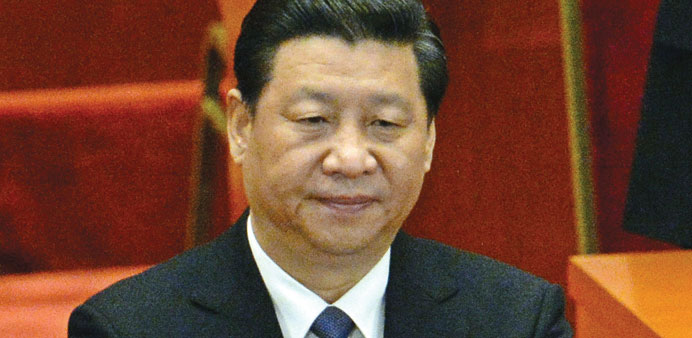By Carol Huang, AFP/Beijing
Xi Jinping has spent much of his first year as China’s president greeting a stream of foreign leaders, but his government’s dual message of power and peace has garnered a mixed response.
Since taking office a year ago on Friday, Xi has made trips to shore up ties with the US and Russia, travelled around Asia, Africa and Latin America, and personally welcomed foreign dignitaries to Beijing more than 80 times, all while governing the world’s most populous country.
Yet his administration’s hard line on numerous territorial disputes with neighbours have frayed ties with Asia’s other key economy Japan, and reinforced fears in the region and beyond that China’s rise poses a threat - something it constantly denies.
The two-pronged approach is intentional. As Xi explained in a key speech on diplomacy last October, China’s goals overseas are “to strive for favourable external conditions for China’s reform, development and stability” and to “uphold national sovereignty”.
But he faces a “fundamental contradiction” in the “attempt to both charm and go on the offensive”, said Paul Haenle, director of the Carnegie-Tsinghua Center for Global Policy at Tsinghua University in Beijing.
The “divergent behaviour risks undermining China’s regional diplomatic strategy if continued”, he said in e-mailed comments.
China’s global interests are expanding - although it struggles to develop an overarching foreign policy - while others are keen to forge ties with the rising power.
“It’s natural that countries near and far, small and large, seek to build strong ties with China,” Haenle said.
At the same time, he added, “China is increasingly dependent on external trade to secure energy, resources, and food security, and thus is highly pragmatic when it comes to forging foreign relations for mutual benefit”.
In his first year as president Xi visited more than a dozen nations, from a BRICS gathering in South Africa to an Apec summit in Indonesia, with multi-country stops in Latin America and Central Asia, while Premier Li Keqiang travelled to South Asia, Europe and elsewhere.
Xi paid extra attention to key countries, taking his first trip as president to Russia and returning twice more within the year.
Moscow is a fellow UN Security Council member with which Beijing often sides on international affairs - although it has adopted an ambiguous position on the Crimea crisis.
Three months into Xi’s term he travelled to California for a two-day summit with President Barack Obama, where he touted a “new type of great-power relationship”, signalling China’s desire to both strengthen ties with the US but also command greater respect.
Xi also managed to meet foreign leaders visiting Beijing nearly once every four days on average. It seemed no country, from Suriname to Macedonia to Fiji, was too small to warrant a handshake from one of the world’s most powerful people.
“That basically covers great powers, regional and developing countries. So it’s a very comprehensive, all-fronts sort of diplomacy,” said Jingdong Yuan, an expert on Chinese foreign policy at the University of Sydney.
In his speech on diplomacy in October, attended by Li and all the country’s top leaders, Xi said China needed to “be more active in blueprinting diplomatic strategy and undertaking diplomatic work”.
“We should clearly present our policies to the outside world... and let the sense of common destiny take root with our neighbours,” he said.
Yet by flexing its muscle in territorial disputes with neighbours, Xi’s administration escalated tensions with Japan and the Philippines and worried other countries.
The dispute with Japan over East China Sea islands stretches back decades, but tensions flared after Tokyo nationalised some of them in September 2012.
Since then Beijing has frequently sent vessels to patrol the region, prompting Tokyo to scramble jets and raising fears of an unintended clash between the world’s second and third-largest economies - which could drag in the US because of its security pact with Japan.
Beijing further antagonised its neighbours last November with a surprise declaration of an “air defence identification zone” over waters including the contested islands.
While other countries also maintain ADIZs, in which aircraft are required to make themselves known to authorities, China’s was denounced in Tokyo and Washington as a provocative move.
Beijing blamed Tokyo for escalating the conflict with its purchase of the islands.
Shen Dingli, a professor of international relations at Fudan University in Shanghai, said that even if Beijing felt justified in its actions, it needed to maintain ties with Tokyo and overcome its stereotype as a bully.
He rated Xi’s diplomatic performance 85 out of 100, docking 10 points for rocky ties with Japan and other neighbours.
“China has tried to revamp its image but without much success. This is still a big issue that President Xi Jinping and his administration need to work on,” he said. “Others feel we are a big country, a great country, and we are less friendly.”

Chinese President Xi Jinping applauds at the closing session of the National People’s Congress at the Great Hall of the People in Beijing on Thursday.
